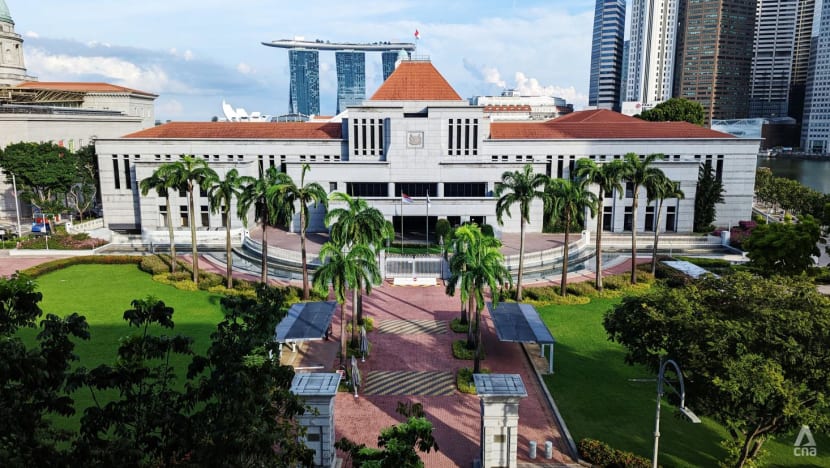Commentary: Do we need Nominated Members of Parliament when there are more opposition MPs than ever?
We need a national conversation on what a future-ready Parliament looks like in Singapore, and how the Nominated Member of Parliament scheme needs to evolve accordingly, says former NMP Anthea Ong.

A general view of the Parliament House in Singapore on Sep 23, 2022. (File photo: CNA/Try Sutrisno Foo)
SINGAPORE: Is the Nominated Member of Parliament (NMP) scheme, which grants non-partisan, unelected individuals up to nine seats in the House, still needed in Singapore?
As a former NMP, I’ve seen plenty of discourse on this topic and have sometimes found it binary and repetitive. One view is that NMPs have been effective in adding value and diversity to parliamentary debates. The other is that the scheme is undemocratic, opaque and increasingly irrelevant.
The NMP scheme was introduced in November 1990 and was made permanent in 2010. Aside from a few updates, its mechanics have stayed essentially the same, even though Singapore looks very different from how it did 32 years ago.
Now that I’ve had the privilege of serving as one from 2018 to 2020, I believe that even with more opposition MPs in Parliament than ever before, NMPs still have a role to play.
As the country embarks on the Forward Singapore exercise to examine values and aspirations, we should also take the opportunity to refresh this uniquely Singapore parliamentary innovation to help maximise its potential.
A NON-PARTISAN CHECK AGAINST A TWO-PARTY SYSTEM
First, the NMP scheme can be strengthened to become a non-partisan check against the divisiveness of a two-party system. We have seen that in mature democracies like the US and UK, a two-party system can lead to bitter partisanship and polarisation.
Much as we must continue to strive for a balanced Parliament, the truth remains that we do not have one now. I would argue that as long as the Whip system remains, there will not be enough scrutiny of the Government by ruling party MPs. Meanwhile, opposition gains may provide more of a check-and-balance, but they too are constrained by the need to toe party lines.
LISTEN - Heart of the Matter: Could the PAP lose power one day and if so, what then?
In much the same way that we have three branches of government under the Constitution, could Parliament also become an equally weighted three-branch structure, with NMPs providing a fully realised “third voice”? This was the original aim of the scheme after all: To provide space for representatives who did not have to play to the gallery and were free to be constructive while dissenting.
And more than a few have. Take the spirited debate over the Protection Against Online Falsehoods and Manipulation Act (POFMA) in 2018, in which Irene Quay, Walter Theseira and I proposed several amendments. Or the equally heated exchange on the Population White Paper in 2013, which three NMPs voted against and one abstained.
Data my team compiled found that NMPs participate at a comparable rate to elected MPs, sometimes even asking more parliamentary questions or speaking up on more Bills. But they still do not receive any secretarial or research support despite their potential in reaching Singapore’s many communities, especially underrepresented ones.
REPRESENTING MINORITY GROUPS
This leads to my next point: NMPs can combat social stratification by representing minority groups left out by the workings of majoritarian democracy.
Our first-past-the-post electoral system means that our Parliament is based on majoritarian representation, not proportional. Because of this, dominant interests and narratives are understandably foremost in the minds of elected politicians on both sides of the House.
But this also means that “unvotables”, like our migrant workers who cannot participate in elections – or “unsayables”, groups or issues which might not endear MPs to voters like LGBTQ – may not be adequately represented in Parliament, even as they live in our midst and form a significant part of our society.
Beyond democratic ideals, we must urgently consider the intergenerational impact of social stratification, especially the availability of opportunities for minority groups. As Albert Camus said, “democracy is not the law of the majority but the protection of the minority”. What kind of Parliament will truly represent all Singaporeans and residents, now and into the future?
For example, could the NMP scheme be reframed as a proportional system that ensures invisible issues get airtime, and to help mitigate rising inequality and widening divides?
I am not saying that elected MPs do not raise such issues: More than a good number have. However, I am not convinced they would do it with the same focus and consistency as NMPs, given that their priority will understandably be the municipal needs of their constituents, or because they see issues as too politically risky.
OPENING NMP SELECTION UP TO THE PUBLIC
Who then should decide which groups and sectors NMPs should be nominated from? Could we exercise participatory democracy and let the public decide what’s important to them?
Perhaps NMP selection could be opened to the public, whether through votes or even district elections.
Currently, as critics of the NMP scheme rightfully point out, the selection process could be made more transparent. For example, my fellow NMP Associate Professor Eugene Tan suggested that applicants’ names should be made public for a start.
But why stop there? Some form of popular mandate is better than none. Given how the public can vote for Singaporean of the Year – which is positioned not as a popularity exercise, but as recognition of the ideals we hold – why not take a similar approach to shortlisting NMP candidates?
Or could we adopt and institutionalise the arts community’s approach of choosing their representative via a town hall? Going even further, what about district elections for candidates to serve as both Mayors and NMPs?
I have more questions than answers, but believe such discussion helps us challenge the status quo and adapt to political changes as we do with economic ones. We need a national conversation on what a future-ready Parliament looks like, and how the NMP scheme needs to evolve accordingly.
We cannot become what we want if we remain what we were 32 years ago. We may have a supermajority Parliament but we also have, by all measures, a strong and effective government that wants the best for Singapore.
However, it no longer holds all the answers for all Singaporeans as we mature as a society. For Parliament to truly represent the people, the people must themselves be involved in ensuring a robust, responsive and inclusive group of representatives in the House.
Anthea Ong is a former Nominated Member of Parliament, social entrepreneur and leadership coach. This commentary contains excerpts from a chapter she wrote in a new book, The NMP Scheme: Are Unelected Voices Still Necessary, which she is an editor of.



















